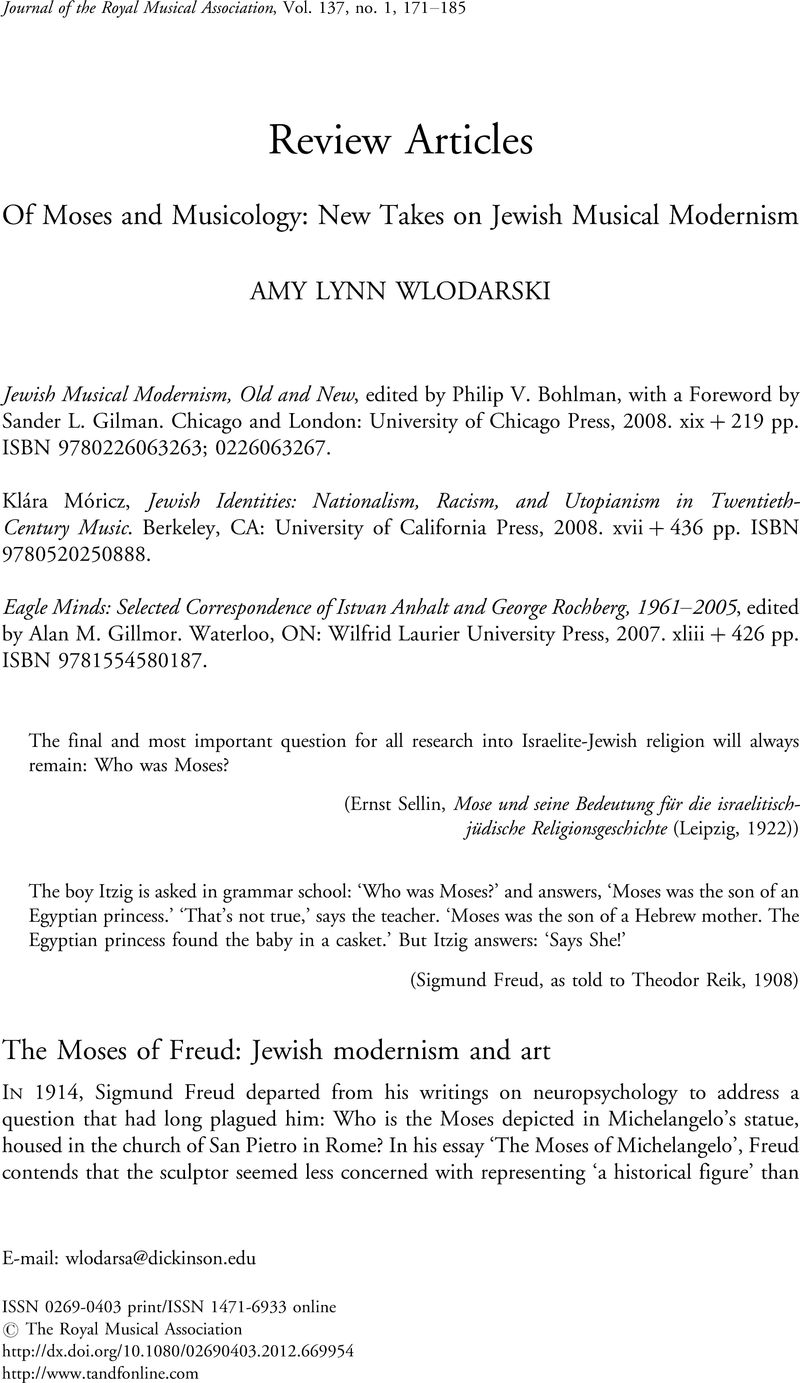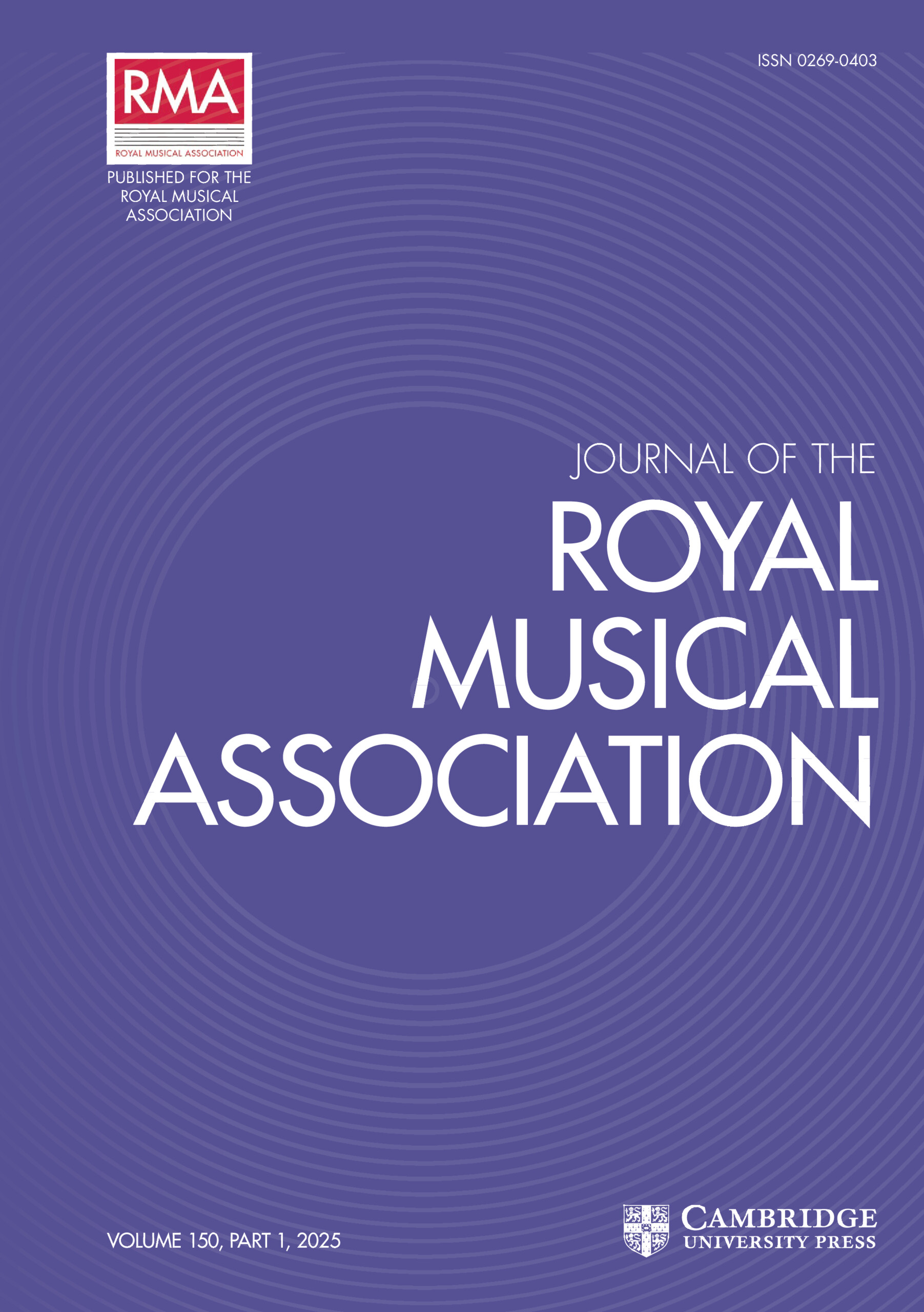No CrossRef data available.
Article contents
Of Moses and Musicology: New Takes on Jewish Musical Modernism
Published online by Cambridge University Press: 01 January 2020
Abstract

- Type
- Review Article
- Information
- Copyright
- Copyright © The Royal Musical Association
References
1 Sigmund Freud, ‘The Moses of Michelangelo’, Writings on Art and Literature, ed. James Strachey (Stanford, CA, 1997), 122–50 (p. 133).
2 Sigmund Freud, ‘The Moses of Michelangelo’, Writings on Art and Literature, ed. James Strachey (Stanford, CA, 1997), 125–6.
3 Sigmund Freud, ‘The Moses of Michelangelo’, Writings on Art and Literature, ed. James Strachey (Stanford, CA, 1997), 126.
4 Abigail Gillman, ‘Freud's Moses and Viennese Jewish Modernism’, The Jewish World of Sigmund Freud: Essays on Cultural Roots and the Problem of Religious Identity, ed. Arnold Richards (Jefferson, NC, 2010), 126–35 (p. 129).
5 Freud, ‘The Moses of Michelangelo’, 136.
6 Freud, ‘The Moses of Michelangelo’, 140.
7 Gillman, ‘Freud's Moses’, 131.
8 Gillman, ‘Freud's Moses’, 131.
9 For an excellent study of Freud's writings on Judaism, see Yosef Hayim Yerushalmi, Freud's Moses: Judaism Terminable and Interminable (New Haven, CT, 1991).
10 Gillman, ‘Freud's Moses’, 133.
11 Freud, Totem and Taboo, as quoted and translated in Richard Cohen, ‘Urban Visibility and Biblical Visions’, Cultures of the Jews: A New History, ed. David Biale (New York, 2002), 731–98 (p. 741).
12 Freud, Moses and Monotheism (New York, 1939), 157.
13 Indeed, Scott Spector argues that while a ‘prescriptive formal definition of [Jewish Modernism] seems futile at best (if not ominous), […] there is a history to be told about a discourse on Jewish modernism in German-speaking central Europe’. See Scott Spector, ‘Modernism without Jews: A Counter-Historical Argument’, Modernism/Modernity, 13 (2006), 615–33 (p. 617).
14 Peter Gay, Freud, Jews and Other Germans: Masters and Victims in Modernist Culture (Oxford, 1978), 21.
15 Hannah Arendt, The Jew as Pariah: Jewish Identity and Politics in the Modern Age (New York, 1978), 92.
16 Cohen, ‘Urban Visibility and Biblical Visions’, 732, 734.
17 Uriel Tal, Christians and Jews in Germany: Religion, Politics, and Ideology in the Second Reich, 1870–1914, trans. Noah Jonathan Jacobs (Ithaca, NY, 1975), 17.
18 Michael Brenner, The Renaissance of Jewish Culture in Weimar Germany (New Haven, CT, 1996), 12.
19 Brenner, The Renaissance of Jewish Culture, 4. See also Eric Hobsbawm, ‘Introduction: Inventing Traditions’, The Invention of Tradition, ed. Hobsbawm and Terence Ranger (Cambridge, 1983), 1–14.
20 Cohen, ‘Urban Visibility and Biblical Visions’, 731.
21 David Biale, ‘Conclusion’, Cultures of the Jews, ed. Biale, 1147–50 (p. 1147).
22 David Biale, ‘Conclusion’, Cultures of the Jews, ed. Biale, 1150.
23 Cohen, ‘Urban Visibility and Biblical Visions’, 764, 734.
24 Yuri Slezkine, The Jewish Century (Princeton, NJ, 2004), 75.
25 Philip V. Bohlman, ‘Introduction: The Transcendent Moment of Jewish Modernism’, Jewish Musical Modernism, ed. Bohlman, 1–30 (p. 16).
26 Mitchell G. Ash, ‘Multiple Modernisms? Episodes from the Sciences as Cultures, 1900–1945’, Jewish Musical Modernism, ed. Bohlman, 31–54 (p. 32).
27 Bohlman, ‘Introduction’, 9.
28 Edwin Seroussi, ‘Sephardic Fin des siècles: The Liturgical Music of Vienna's Türkisch-Israelitische Community on the Threshold of Modernity’, Jewish Musical Modernism, ed. Bohlman, 55–80.
29 Kay Kaufman Shelemay, ‘Echoes from Beyond Europe: Music and the Beta Israel Transformation’, Jewish Musical Modernism, ed. Bohlman, 102–24.
30 Michael P. Steinberg, ‘Charlotte Salomon's Modernism’, Jewish Musical Modernism, ed. Bohlman, 125–52.
31 Bohlman, ‘Introduction’, 5.
32 Bohlman, ‘Introduction’, 2.
33 Bohlman, ‘Introduction’, 4, 8.
34 Bohlman, ‘Epilogue: Beyond Jewish Modernism’, Jewish Musical Modernism, ed. Bohlman, 153–77 (p. 154).
35 Bohlman, ‘Epilogue: Beyond Jewish Modernism’, Jewish Musical Modernism, ed. Bohlman, 155.
36 Bohlman, ‘Epilogue: Beyond Jewish Modernism’, Jewish Musical Modernism, ed. Bohlman, 155.
37 Bohlman, ‘Epilogue: Beyond Jewish Modernism’, Jewish Musical Modernism, ed. Bohlman, 160.
38 Bohlman, ‘Epilogue: Beyond Jewish Modernism’, Jewish Musical Modernism, ed. Bohlman, 161.
39 Bohlman, ‘Epilogue: Beyond Jewish Modernism’, Jewish Musical Modernism, ed. Bohlman, 165.
40 Bohlman, ‘Epilogue: Beyond Jewish Modernism’, Jewish Musical Modernism, ed. Bohlman, 167.
41 Bohlman, ‘Epilogue: Beyond Jewish Modernism’, Jewish Musical Modernism, ed. Bohlman, 162.
42 Bohlman, ‘Epilogue: Beyond Jewish Modernism’, Jewish Musical Modernism, ed. Bohlman, 168, 171.
43 Móricz, Jewish Identities, 233.
44 Móricz, Jewish Identities, 234.
45 Móricz, Jewish Identities, 234, 235–6.
46 Móricz, Jewish Identities, 237.
47 Móricz, Jewish Identities, 2, 1.
48 Móricz, Jewish Identities, 1.
49 Móricz, Jewish Identities, 351.
50 Móricz, Jewish Identities, 7.
51 Most scholars seize upon Schoenberg's 4 August 1933 letter to Anton Webern, in which he confides: ‘I have long since resolved to be a Jew. […] It is my intention to take an active part in endeavors of this kind. I regard that as more important than my art, and am determined […] to do nothing in [the] future but work for the Jewish national cause.’ See Willi Reich, Schoenberg; A Critical Biography, trans. Leo Black (London, 1971), 49.
52 Móricz, Jewish Identities, 208, 209.
53 Móricz, Jewish Identities, 214–15, 224.
54 Móricz, Jewish Identities, 285.
55 Alexander Ringer, The Composer as Jew (Oxford, 1990), 203.
56 David Liebermann, ‘Schoenberg Rewrites his Will: A Survivor from Warsaw, Op. 46’, Political and Religious Ideas in the Works of Arnold Schoenberg, ed. Charlotte M. Cross and Russell A. Berman (New York, 2000), 193–229 (pp. 212–13).
57 See Bohlman, ‘Introduction’, 6–7.
58 Theodor W. Adorno, ‘Engagement’, quoted in Móricz, Jewish Identities, 295.
59 Móricz, Jewish Identities, 295.
60 Móricz, Jewish Identities, 297.
61 Michel Foucault, ‘Of Other Spaces’, trans. Jay Miskowiec, Diacritics, 16 (1986), 22–7 (p. 24).
62 Móricz, Jewish Identities, 340.
63 Bohlman, ‘Introduction’, 23.
64 Bohlman, ‘Introduction’, 23.
65 Móricz, Jewish Identities, 352.
66 See Theodor W. Adorno, ‘The Aging of the New Music’, Essays on Music, ed. Richard Leppert (Berkeley, CA, 2002), 181–202.
67 Alan M. Gillmor, ‘Introduction’, Eagle Minds, ed. Gillmor, xii–xliii (p. xvi).
68 Rochberg to Anhalt, 14 July 1969; Eagle Minds, ed. Gillmor, 74.
69 Anhalt to Rochberg, 5 August 1969; Eagle Minds, ed. Gillmor, 74.
70 For a more in-depth discussion of Foci, see Istvan Anhalt, Pathways and Memory, ed. Robin Elliott and Gordon E. Smith (Montreal, 2001), 151–3.
71 Rochberg to Anhalt, 20 May 1984; Eagle Minds, ed. Gillmor, 140.
72 Rochberg to Anhalt, 20 May 1984; Eagle Minds, ed. Gillmor, 140.
73 Anhalt to Rochberg, 27 May 1984; Eagle Minds, ed. Gillmor, 142.
74 Rochberg, ‘Humanism Versus Science’, The Aesthetics of Survival: A Composer's View of Twentieth-Century Music, ed. William Bolcom (Ann Arbor, MI, 2005), 135–44 (p. 139).
75 Rochberg, ‘Humanism Versus Science’, The Aesthetics of Survival: A Composer's View of Twentieth-Century Music, ed. William Bolcom (Ann Arbor, MI, 2005), 144.
76 Rochberg, ‘Humanism Versus Science’, The Aesthetics of Survival: A Composer's View of Twentieth-Century Music, ed. William Bolcom (Ann Arbor, MI, 2005), 144.
77 Anhalt to Rochberg, 13 April 1985; Eagle Minds, ed. Gillmor, 161.
78 Rochberg to Anhalt, 23 April 1985; Eagle Minds, ed. Gillmor, 165.
79 Gillmor, ‘Introduction’, xxiii.
80 illmor, ‘Introduction’, xxiv.
81 Rochberg to Anhalt, 31 January 1988; Eagle Minds, ed. Gillmor, 206–7.
82 Anhalt to Rochberg, 9 February 1988; Eagle Minds, ed. Gillmor, 208–9.
83 Rochberg to Anhalt, 17 February 1988; Eagle Minds, ed. Gillmor, 212.
84 Rochberg to Anhalt, 2 March 1999; Eagle Minds, ed. Gillmor, 354.
85 Theodor W. Adorno, ‘What Does Coming to Terms with the Past Mean?’, Bitburg in Moral and Political Perspective, ed. Geoffrey H. Hartman (Bloomington, IN, 1986), 114–29 (p. 115).
86 Steven D. Fraade, ‘Rabbinic Midrash and Ancient Jewish Biblical Interpretation’, The Cambridge Companion to the Talmud and Rabbinic Literature, ed. Charlotte Elisheva Fonrobert and Martin S. Jaffee (Cambridge, 2007), 99–120 (pp. 102–3).
87 Ibid., 101 (italics original).




